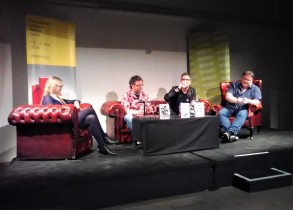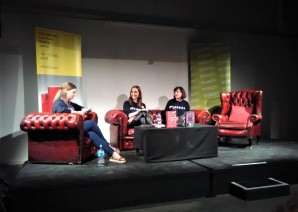As you can see from my past event round-ups, DeptCon has become something of a staple in the Irish YA scene.
“But Arianne,” you whisper, aghast, “doesn’t DeptCon usually take place in… October?”
Yes, it does! This year, however, there was SURPRISE appearance from the DeptCon squad with their summertime We Love YA! event as part of the ongoing International Literature Festival. There were three panels plus signings, and I was lucky enough to attend (and bring back all the deets for you).
“Writing myself into this country”: Muhammad Khan, Emma Quigley and Mary Watson talk ‘New Voices’, chaired by Shane Hegarty

L-R: Shane Hegarty, Mary Watson, Emma Quigley, Muhammad Khan
The first panel, themed around the idea of ‘New Voices’, featured three debut YA writers (though Watson is an award-winning South African writer for adults, The Wren Hunt is her first book for teenagers). Hegarty’s questions drew answers on inspirations, writing routines, what they’d be working on next, and more.
Muhammad Khan’s biggest influence has been his time as a maths teacher and tutor in a school where most students are from BAME backgrounds. His students contributed to drafts of what became I Am Thunder, inspiring everything from Muzna’s shyness to the fact that he had the book’s cover artist thicken her eyebrows so that they’d be suitably “on fleek”! He decided to tackle themes like radicalisation and racism in YA partly because of the UK government’s Prevent strategy, which he realised was causing students to clam up in case their questions or experiences got them into trouble. His advice for young writers: “Write a book that you want to write…. don’t follow trends, because by the time you finish your book that trend will be over”. He’s currently working on another contemporary featuring different characters, exploring toxic masculinity ‘through the eyes of a very gentle boy’.
Emma Quigley’s début Bank (out from Little Island Books) is the comedy-drama story of a group of teen boys who decide to start money-lending to classmates, only to make a series of increasingly risky investments as their plans begin to unravel. Quigley wanted to write about friendships between teenage boys but also ended up mirroring twenty-first century financial crises. She spoke about how her son was a reader who often said his friends weren’t – she wanted to write something that would appeal to that drop-off point of readership, and Bank actually sounds really exciting! It was also revealed that her son wrote the tagline for the book: “Lunch money just got serious”!
Mary Watson became fascinated by the Irish tradition of the wren hunt – in which a real or stand-in wren is chased and hunted on St. Stephen’s Day (the day after Christmas Day) – after moving to Ireland from South Africa. She wanted to write a book that she could only have written here, even though The Wren Hunt is technically a fantasy or magical realism novel, full of “quiet magic, everyday magic”. She cited Diana Wynne Jones as an influence and spoke with real feeling about the wealth of African literature that doesn’t always make it to mainstream audiences in the Anglosphere. Watson’s was the only book I’d read of the three before the panel, but I think the discussion did its job because by the end of it I was so intrigued by I Am Thunder and Bank.
“The nineties were dull as dishwater”: Brian Conaghan, Derek Landy and Katherine Webber in ‘Nerd Alert!’, chaired by David O’Callaghan

L-R: Katie Webber, David O’Callaghan, Brian Conaghan, Derek Landy
Most literary festival panels (naturally) focus on the literary side of life, but this panel was more about pop culture and what it meant to three writers growing up. They talked about the extent to which you can make pop culture references in a book but otherwise concentrated on beloved films, TV and music. There was a lot of love for the ’80s, but most of the ’90s love was for Webber’s Wing Jones, which is set in 1996 Atlanta – read more about it here!).
Katherine Webber can quote much of Clueless; Conaghan made an impassioned speech on behalf of Grease and declared his belonging to a small global cult following of its much-maligned sequel; Derek Landy apparently owns half the prop department of multiple comic book adaptations, including the original Superman costume and cape. Katie credits Sailor Moon (only half-jokingly) with piquing her interest in Asian culture – she later studied Japanese, then Chinese, and moved to Hong Kong to study. Conaghan was into eternally cool bands, while Webber is an unashamed pop fan.
The conversation returned to literature to discuss favourite childhood books. Katie loves A Wrinkle in Time so much that it featured in at least three different ways at her wedding (shoutout to husband and Sam Wu co-writer Kevin Tsang for highest number of cameo mentions), while Landy commented on the past dearth of YA which once meant going straight from children’s books to crime fiction. Perhaps most interestingly, Brian Conaghan was frank about the fact that he was 17 when he first read a novel and had a reading age of 12 when he was 16, partly due to lack of access to a library or books at school. I so admired Conaghan’s work on We Come Apart and really appreciated someone pointing out that not all readers or writers come to books in the same way.
“I always felt like a changeling. I never felt like I belonged”: Louise O’Neill and Deirdre Sullivan talk ‘Dark Fairytales’, chaired by Elaina Ryan

L-R: Elaina Ryan, Louise O’Neill, Deirdre Sullivan, wearing ‘Repeal’ gear
There was something of a uniform for this event on feminist retellings of fairytales. Both Louise O’Neill and Deirdre Sullivan have recently released fairytale retellings: O’Neill’s The Surface Breaks takes on The Little Mermaid, while Sullivan’s Tangleweed and Brine is a collection of twelve short stories which draw on not just The Little Mermaid but fairytales like Rapunzel and Sleeping Beauty (you can read more about the book here!).
This was the only panel in which the authors were asked to read from their books, which was a fantastic way to introduce or reintroduce the audience to the stories in question. It was O’Neill’s first time reading from The Surface Breaks at an event (she read a scene featuring a character called Sadhbh, a name she insisted on because “the English find it very confusing and I find that very amusing”). Tangleweed and Brine is almost like prose poetry, making it chillingly effective when read aloud. Both books are quite dark – but that’s because, as O’Neill and Sullivan pointed out, the source fairytales are also quite dark. The Little Mermaid’s original ending at the hands of Hans Christian Anderson, for example, is incredibly unsettling.
There was plenty of talk about that most famous of fairytale strains, the Disney film, but it’s not all bad – there was definite agreement that movies like Frozen and Moana have appreciably feminist moments (in Elaina Ryan’s immortal words on Moana: “she seems like good craic”). And indeed, it is the complicated, sometimes sanitised history of the fairytale that seems to provide such scope for feminist reinterpretation, as both Louise and Deirdre would write another fairytale retelling if they had the chance. O’Neill would love to get her hands on Beauty and the Beast, while Sullivan would like to pair the ‘earth and water’ theme of Tangleweed and Brine with another collection on what I thought would just be ‘air and fire’ but was actually termed the far more poetic ‘breath and ember’.
So there you have it! Did you attend this edition of DeptCon? Have you read any of the books mentioned? Are any of them on your TBR?








 Author(s): T.S. Easton
Author(s): T.S. Easton



